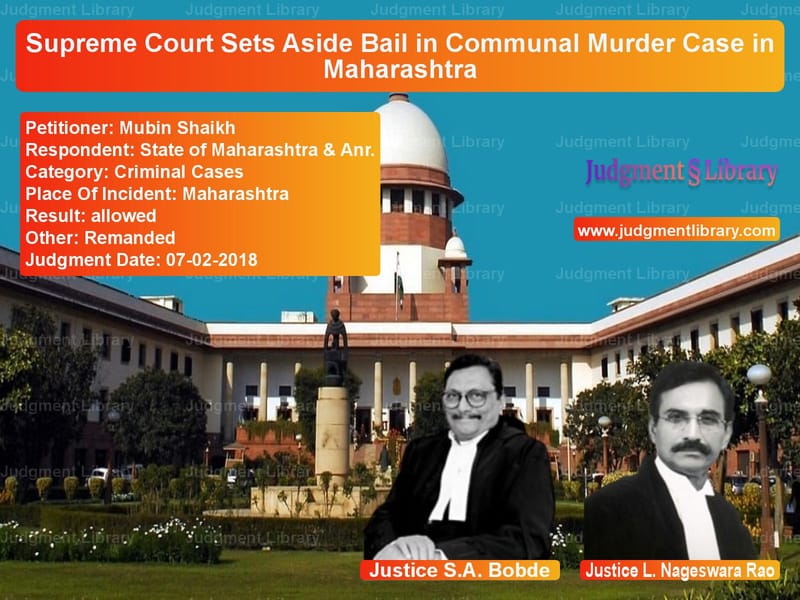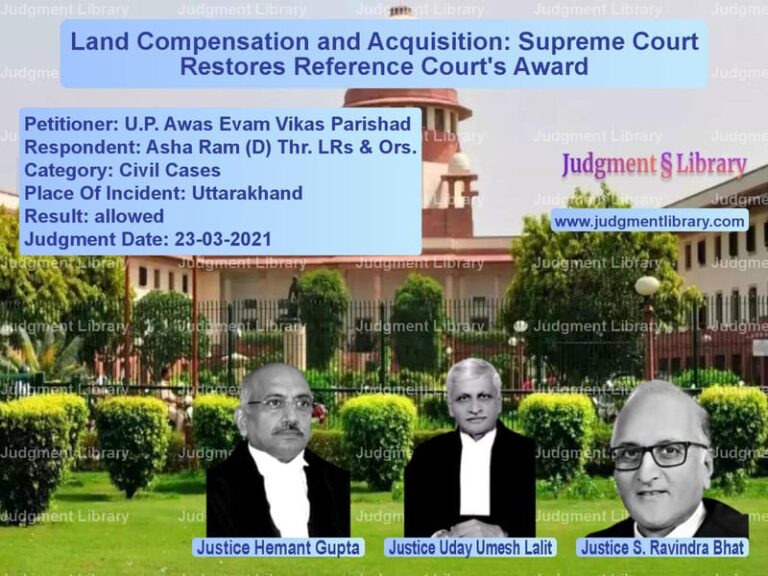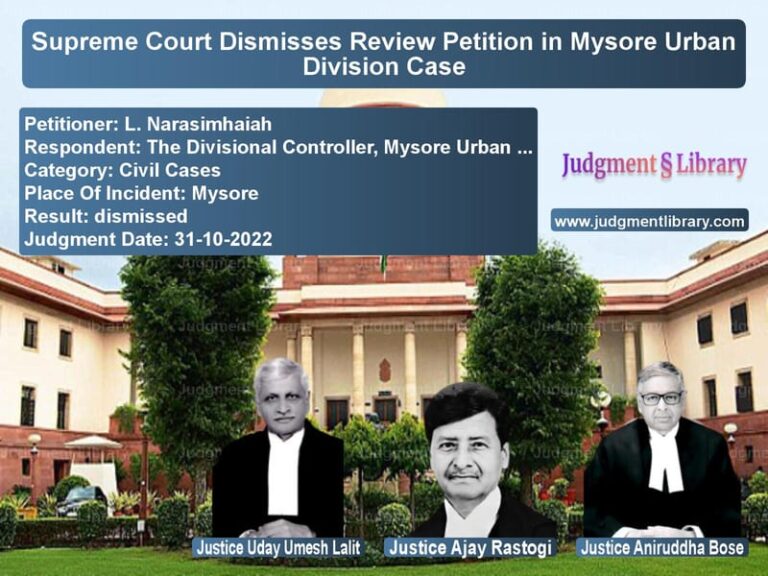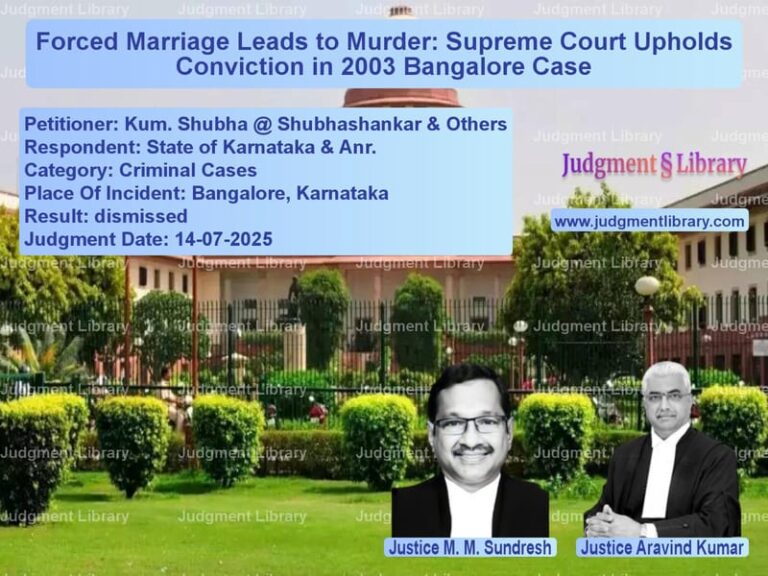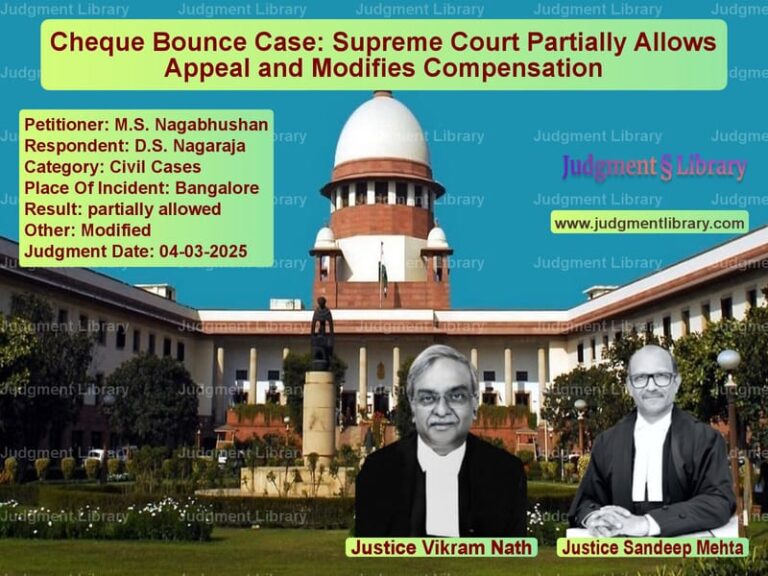Supreme Court Sets Aside Bail in Communal Murder Case in Maharashtra
The Supreme Court of India, in its judgment dated February 8, 2018, ruled on a highly sensitive case involving a communal murder in Maharashtra. The case, Mubin Shaikh vs. The State of Maharashtra & Anr., centered around the brutal killing of a Muslim youth, Shaikh Mohsin, allegedly by members of the Hindu Rashtra Sena. The Court examined the legality of bail granted by the Bombay High Court and emphasized the importance of impartiality in judicial observations.
Background of the Case
The incident took place on June 2, 2014, at around 9:00 PM, when Shaikh Mohsin was on his way to dinner with a friend, Riyaz. He was attacked by a group of individuals armed with hockey sticks, bats, and stones. The prosecution alleged that the accused targeted him because he belonged to a specific community and had attended a meeting of the Hindu Rashtra Sena shortly before the attack.
The Sessions Court in Pune initially denied bail to the accused, citing strong prima facie evidence. However, the Bombay High Court granted bail, making controversial observations regarding the motive behind the crime.
Key Legal Issues
- Whether the Bombay High Court erred in granting bail to the accused based on its observations.
- Whether the communal identity of the victim could be considered a mitigating factor in granting bail.
- The role of courts in handling cases involving communal violence impartially.
Petitioner’s Arguments (State of Maharashtra & Shaikh Mohsin’s Family)
The prosecution and the victim’s family argued:
“The accused attacked Shaikh Mohsin solely because of his religious identity. Granting bail on this basis sends a dangerous message and undermines the principles of justice.”
Their primary arguments included:
- The Sessions Court correctly denied bail, noting that 23 individuals (including two juveniles) participated in the attack.
- The victim had no prior history of conflict with the accused, proving that the attack was premeditated and communal.
- The High Court’s observation that “the fault of the deceased was only that he belonged to another religion” created an impression of justification, which was legally and morally untenable.
Respondent’s Arguments (Accused)
The accused, while applying for bail, contended:
“The meeting of the Hindu Rashtra Sena was held half an hour before the incident. The accused had no personal enmity with the victim, and the assault was not premeditated.”
The defense further argued:
- The accused had no prior criminal record.
- They were provoked into committing the crime in the heat of the moment.
- The bail granted by the High Court was justified, considering their lack of prior offenses.
Supreme Court’s Judgment
The Supreme Court criticized the Bombay High Court’s reasoning, stating:
“The fact that the deceased belonged to a certain community cannot be a justification for any assault, much less a murder.”
The Court highlighted several critical points:
- The High Court’s observation that the accused were “provoked in the name of religion” was unwarranted and created a perception of justification.
- Judicial officers must avoid making remarks that could be construed as biased or prejudicial to any community.
- The grant of bail in a communal murder case should be based on legal merits and not on the communal identity of the victim.
The Supreme Court set aside the bail order and directed that the accused be taken into custody, restoring the bail applications before the Bombay High Court for fresh consideration.
Implications of the Judgment
- Reaffirms Judicial Impartiality: The ruling reinforces that courts must remain neutral and not make observations that could be misinterpreted.
- Prevents Misuse of Bail: The judgment clarifies that bail cannot be granted on grounds that may appear to justify the crime.
- Strengthens Communal Harmony: The Supreme Court’s intervention sends a strong message against hate crimes and ensures accountability.
Conclusion
The Supreme Court’s decision in Mubin Shaikh vs. State of Maharashtra is a landmark ruling emphasizing the role of courts in upholding justice without any communal bias. By setting aside the bail granted by the High Court, the ruling ensures that communal violence is dealt with strictly under the law, reaffirming the judiciary’s commitment to constitutional principles.
Petitioner Name: Mubin ShaikhRespondent Name: State of Maharashtra & Anr.Judgment By: Justice S.A. Bobde, Justice L. Nageswara RaoJudgment Date: 07-02-2018
Don’t miss out on the full details! Download the complete judgment in PDF format below and gain valuable insights instantly!
Download Judgment: Mubin Shaikh vs State of Maharashtra Supreme Court of India Judgment Dated 07-02-2018.pdf
Direct Downlaod Judgment: Direct downlaod this Judgment
See all petitions in Murder Cases
See all petitions in Bail and Anticipatory Bail
See all petitions in Extortion and Blackmail
See all petitions in Judgment by S. A. Bobde
See all petitions in Judgment by L. Nageswara Rao
See all petitions in allowed
See all petitions in Remanded
See all petitions in supreme court of India judgments February 2018
See all petitions in 2018 judgments
See all posts in Criminal Cases Category
See all allowed petitions in Criminal Cases Category
See all Dismissed petitions in Criminal Cases Category
See all partially allowed petitions in Criminal Cases Category

